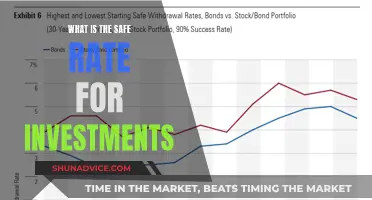
Private equity is a dynamic investment opportunity in India, offering high returns and unique prospects for investors seeking substantial financial gains. It involves investing directly in private companies that are not listed on the stock exchange, providing financial expertise and capital to fuel growth. India's thriving economy, expanding consumer market, and entrepreneurial ecosystem make it an attractive destination for private equity investors.
The private equity industry in India has witnessed significant growth, with the total value of deals increasing exponentially from $26 billion in 2019 to $70 billion in 2022. This growth has been driven by a diverse investor base, innovative digital infrastructure, and a supportive regulatory environment.
Private equity firms in India, such as Sequoia Capital, Kotak Private Equity, and Blackstone Group, play a pivotal role in fostering innovation and growth across various sectors, including technology, healthcare, and infrastructure. They provide valuable support to their portfolio companies, including strategic guidance and operational expertise, contributing to the overall success and economic development of the country.
In this evolving landscape, it is essential for investors to understand the complexities, risks, and potential rewards of private equity investments. While it offers high-return opportunities, private equity also requires a large upfront investment and a longer time commitment.
| Characteristics | Values |
|---|---|
| Type of Investment | Private equity is an investment fund where individuals or institutions invest directly in private companies not listed on the stock exchange. |
| Investment Size | Private equity requires a large upfront investment. |
| Time Commitment | Private equity demands a longer time commitment. |
| Investor Control | Investors have no control over the decisions made by the company's management. |
| Investor Type | High-net-worth individuals or institutional investors. |
| Investment Objective | Private equity investors aim for higher returns than traditional investments. |
| Investment Destination | Private equity funds are invested in specific companies or groups of companies with growth potential. |
| Investor Role | Private equity investors are generally not involved in running the company but may advise and help develop strategies. |
| Exit Strategy | Private equity investors can exit their investment through various strategies, such as selling their stake or facilitating an initial public offering (IPO). |
| India's Private Equity Market | India's private equity market has witnessed significant growth, attracting global investors with its diverse population and expanding consumer market. |
| Popular Private Equity Firms in India | Kotak Private Equity, Chrys Capital, Sequoia Capital, Blackstone Group, ICICI Venture Fund Management, KKR, Carlyle, Warburg Pincus, Advent International, TPG. |
What You'll Learn
- High-net-worth individuals can invest in private equity
- Private equity firms take a hands-on approach to investment
- Private equity offers higher returns than traditional investments
- Private equity firms conduct extensive due diligence before investing
- Private equity is a dynamic force in India's economy

High-net-worth individuals can invest in private equity
Private equity (PE) is an attractive investment option for high-net-worth individuals (HNIs) in India. It allows them to invest in private companies that are not listed on the stock exchange, offering the potential for higher returns compared to traditional investments. However, it also requires a large upfront investment and a longer time commitment.
HNIs who want to invest in private equity in India should consider the following:
Understanding Private Equity
High-net-worth individuals should first understand the basics of private equity. Private equity is a type of investment where wealthy individuals put their money into private companies not listed on the stock exchange. It offers a unique opportunity to support private companies with high growth potential and earn attractive returns. While it requires a large investment and a long-term commitment, private equity can provide diversification benefits to an investor's portfolio.
Due Diligence and Research
Conducting thorough due diligence is essential before investing in private equity. HNIs should research and evaluate the private equity firm, its track record, investment strategy, management team, and fee structure. It is crucial to assess the potential risks and returns associated with the investment, including financial, market, regulatory, and operational risks.
Investment Size and Regulatory Framework
Private equity investments typically have a high minimum investment size, and HNIs should be prepared to invest a significant amount. It is important to understand the regulatory framework governing private equity in India, including foreign investment regulations, securities laws, tax implications, and compliance requirements.
Types of Private Equity Investors and Funds
There are different types of private equity investors and funds, each with its own focus and investment strategy. HNIs can consider venture capital funds, which specialise in providing early-stage and growth-stage capital to startup companies. Other types include buyout funds, mezzanine capital, distressed private equity, and real estate private equity.
Partnering with Private Equity Firms
Private equity firms play a crucial role in the investment process. These firms raise capital from HNIs and other investors, conduct due diligence on potential investment opportunities, and actively manage the invested companies. It is important for HNIs to partner with reputable and experienced private equity firms that have a successful track record in the Indian market.
Long-Term Investment Horizon
Private equity investments typically have a long-term investment horizon, often ranging from 3 to 7 years or more. HNIs should be prepared to commit their capital for an extended period and closely work with the private equity firm to drive strategic initiatives and operational improvements in the invested companies.
By following these considerations, high-net-worth individuals can make informed decisions about investing in private equity in India. It allows them to access the potential of India's dynamic economy, support promising companies, and diversify their investment portfolios.
Valuing Investment Management Firms: Strategies for Success
You may want to see also

Private equity firms take a hands-on approach to investment
Private equity firms are actively involved in managing their portfolio companies, offering strategic guidance, operational expertise, and access to industry experts. They work closely with company management to develop and implement strategic initiatives aimed at creating value. This hands-on approach to investment is a key characteristic of private equity firms and sets them apart from other types of investors.
Private equity firms conduct extensive due diligence on a company's business model, management team, industry dynamics, and growth potential before investing. They seek out distressed companies, businesses with growth potential, or those that can benefit from operational improvements. By investing in these companies, private equity firms aim to enhance their value over a specific investment horizon, typically 4-5 years, before exiting and reaping profits. This short-term focus allows them to create value quickly and exit with maximum returns.
Once a suitable target is identified, the private equity firm invests capital, which can take the form of equity, debt, or a combination of both. They then work with the company's management to implement operational improvements and strategic changes to increase the company's value. This may include increasing efficiency, cutting costs, exploiting synergies, and ultimately boosting profits. The private equity firm's expertise and network of industry connections play a crucial role in driving these improvements.
Private equity firms typically have a predetermined timeline for their investments, usually around 3 to 7 years. During this period, they actively manage the company, providing ongoing support and guidance. Once they believe the company has reached its full potential or favourable market conditions arise, they exit their investment through various means, such as selling the company to another business or conducting an initial public offering (IPO).
The hands-on approach of private equity firms contributes to the overall growth of the companies they invest in. Their active involvement, strategic guidance, and operational expertise help struggling or promising companies reach their full potential. By taking a hands-on role, private equity firms not only increase the value of their investments but also foster innovation and growth across industries in India.
Investment Managers vs Vanguard: Who Should You Trust?
You may want to see also

Private equity offers higher returns than traditional investments
Private equity has gained traction in India, with its diverse population and expanding consumer market attracting global investors. Private equity investments offer higher returns than traditional investments, making them a popular choice for high-net-worth individuals and institutional investors.
Higher Returns
Private equity firms have a strategic focus on "buying to sell", which generates higher returns than the "buying to keep" approach often employed by public companies. Private equity firms seek out undervalued or under-managed companies, aiming to increase their value before selling for a maximum return.
Long-Term Approach
Private equity investments take a long-term approach, focusing on capitalising new businesses, developing innovative business models, and restructuring distressed companies. This long-term perspective contributes to higher returns over time.
Active Involvement
Private equity firms are actively involved in managing their portfolio companies, providing strategic guidance, operational expertise, and access to industry experts. This active involvement contributes to the success of the companies they invest in, leading to higher returns.
Access to Opportunities
Private equity firms have access to a larger pool of unknown opportunities that are not available in the public markets. They have the resources to conduct due diligence on these companies and identify those with the highest growth potential. Investing early in these companies allows private equity firms to benefit from higher returns as the companies succeed.
Alignment of Interests
Private equity fund managers are incentivised by the "carry", earning a percentage of the fund's profits, typically 20%. This aligns their interests with those of the investors, as they only profit when the investors profit.
Risk and Reward
While private equity investments carry a higher risk, the potential for higher returns makes them attractive to investors. Private equity funds have a wider range of returns compared to other alternative asset classes, and the selection of the right fund is crucial.
In summary, private equity offers higher returns than traditional investments due to their strategic focus, long-term approach, active involvement, access to opportunities, alignment of interests, and the potential for higher returns despite the higher risk.
Integrity Metrics: Management's Investment Guide
You may want to see also

Private equity firms conduct extensive due diligence before investing
Commercial Due Diligence
Commercial due diligence evaluates the industry and the target company's position in the marketplace. It involves understanding the industry dynamics, technology, recent transactions, growth trends, competitive landscape, and the company's positioning against its competitors. This analysis helps identify the financial viability of the target company and assess its future potential.
Financial Due Diligence
Financial due diligence involves a deep dive into the target company's financial performance, projections, accounting practices, customer contracts and invoices, customer acquisition costs, customer lifetime value, intellectual property, and bad debt or write-offs. A critical aspect of this is the Quality of Earnings (Q of E) assessment, which focuses on the company's growth prospects, risk factors, and expected ongoing earnings.
Legal Due Diligence
Legal due diligence ensures that the target company has its legal, regulatory, and compliance matters in order. It includes reviewing articles of incorporation, shareholder lists, bylaws, compliance with state and federal laws, legal claims, liabilities, supply and purchase agreements, and contractual agreements with vendors, suppliers, and customers. It also considers the legal consequences of a change in control at the target company.
Management and Operations Due Diligence
This area focuses on the performance of the management team, the organizational structure, and opportunities for operational improvements. It involves identifying unprofitable products, evaluating the potential of strategic resource infusion, and exploring new sales and marketing channels. Due diligence in this area ensures that the private equity firm can effectively work with the portfolio company's management team to drive growth and improve operations.
IT Due Diligence
As most companies rely on technology and IT infrastructure, IT due diligence evaluates the target company's current technology capabilities, scalability, data management practices, cybersecurity, and agreements with outside IT providers.
Overall, due diligence in private equity is a critical step to minimize risks, maximize value, and make sound investment decisions. It helps private equity firms gather the necessary information to prepare an appropriate purchase price and business plan for the target company.
Saving and Investment: Synergistic Strategies for Financial Growth
You may want to see also

Private equity is a dynamic force in India's economy
The private equity market in India has witnessed significant growth and evolution, becoming a vital component of the country's financial ecosystem. The industry has benefited from a broadened investor base, diverse pools of capital, and an innovative digital infrastructure. With its dynamic consumer market and thriving entrepreneurship, India presents high-growth opportunities for private equity investors. The total value of private equity deals in India reached $70 billion in 2022, a substantial increase from $26 billion in 2019, showcasing the market's exponential expansion.
Private equity firms in India actively fund ventures across diverse sectors, including technology startups and established businesses. They provide much-needed capital to financially distressed companies and propel the growth of profitable ventures. These firms play a pivotal role in fostering innovation and driving strategic initiatives and operational improvements within their portfolio companies. By investing in specific sectors or industries, private equity funds leverage their expertise to identify and capitalize on niche market opportunities.
The allure of private equity lies in its potential for high returns. While it entails higher risks, successful private equity investments can yield significantly higher returns compared to traditional investments. Private equity investors, often referred to as private equity firms or investors, consist of institutional investors such as pension funds, endowments, foundations, insurance companies, and high-net-worth individuals. These investors pool their capital to form investment funds, aiming for substantial growth and profitability.
Private equity in India has proven to be a valuable source of capital, supporting businesses and contributing to the country's economic development. It offers unique investment opportunities, playing a dynamic role in entrepreneurship, job creation, and overall economic growth. As India's economy continues to evolve, private equity is poised to remain a powerful force, shaping the country's business landscape and unlocking new possibilities.
Create a Portfolio on Investing.com: A Step-by-Step Guide
You may want to see also
Frequently asked questions
Private equity (PE) is a type of investment fund where wealthy individuals put their money into private companies not listed on the stock exchange.
Private equity investors can include high-net-worth individuals, institutional investors such as banks and insurance companies, foreign institutional investors, private equity funds, accredited investors, and qualified institutional buyers.
Private equity offers the potential for high returns, portfolio diversification, and the ability to invest in promising companies that are not publicly traded. It also provides investors with more flexibility as they are not bound by the regulations and reporting requirements of public companies.
Look for a private equity firm with a strong track record of generating good returns on investment. Ensure their investment strategy aligns with your goals, and that they have a reputable and experienced management team. A good private equity firm should also have a rigorous due diligence process and provide clear and timely updates on the performance of their portfolio companies.







